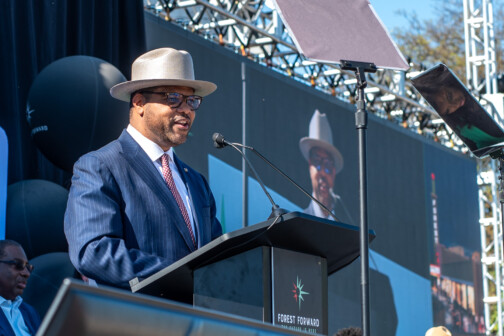Last Updated, 4/29 9:15 a.m. This story was originally published on 4/28.
The Texas Legislature will wrap its 88th session in May, and cities and counties statewide are warily watching legislation they say seeks to wrest control away from local governments.
Some of the bills that would impact the way local government operates have received a lot of attention. That’s headlined by Senate Bill 990, which would eliminate countywide polling places. That bill passed the Texas Senate this week and has been referred to the House Elections Committee.
The so-called “Death Star” Bill, House Bill 2127, would prevent cities and counties from passing new ordinances on a variety of issues or enforcing ones that already exist. If passed, the legislation would limit a city or county’s ability to regulate how a broad swath of businesses operate. For instance, should the bill pass, Dallas’ ordinance requiring water breaks for construction crews would be illegal to enforce.
It attracted dozens of Republican sponsors, including Park Cities resident Morgan Meyer (R-108). The bill passed the House last week and has been referred to the Senate Business & Commerce Committee. If it makes it out, it faces a friendly Republican-controlled senate.
Dallas City Councilman Tennell Atkins, who chairs the Council’s Ad Hoc Committee on Legislative Affairs, established the stakes in a recent memo to Dallas state Rep. Rafael Anchia. A whole slew of city policy would be blocked by the legislation.
Those include ordinances requiring city contractors pay their employees a $15 an-hour minimum wage; its regulation of sexually-oriented businesses; insurance requirements for a variety of circumstances, including ambulances, dockless vehicles, and towing; anti-discrimination provisions relating to labor unions and ethics; leave policy for city employees; and city code regarding animal breeding permits, boarding homes, and burglar alarms.
The bill’s sponsor, state Rep. Dustin Burrows (R-Lubbock), says the impetus was to simplify things for small business owners, not limit the ability of cities and counties to govern. Atkins and others argue that, should the bill pass, the intent is different from reality.
“We want those small-business owners creating new jobs and providing for their families, not trying to navigate a byzantine array of local regulations that twist and turn,” Burrows told the Texas Tribune.
The business lobby supports the measure. In a statement, National Federation of Independent Business state director Annie Spilman said the statewide legislation was friendlier to businesses because of its “consistency.”
“Amid rate hikes from the Fed, supply chain disruptions, and a worker shortage, all this uncertainty continues to be exacerbated by local regulations and mandates,” she wrote. “The patchwork of regulations that currently exist in Texas makes it more difficult for a business to operate and create jobs. The world’s ninth-largest economy shouldn’t be subjected to the whims of rogue regulators – who often pass onerous mandates in the dead of night.”
(It’s been years since the Dallas City Council passed anything “in the dead of night,” for the record.)
There have been 10,296 bills filed in the legislature this session. As of this writing, 1,596 have passed. Sine Die, the last day of the legislative session, is May 29. Back-of-the-envelope math indicates that the legislature has 31 days to churn through 8,700 bills, many of which haven’t left the committees to which they’re assigned.
That means the legislature would need to push through about 280 bills a day by the end of May, including those bills that would ostensibly reduce a city’s ability to pass regulations on any manner of issues.
A bill must move out of committee before it can be passed in either chamber. The committee chair sets out which legislation the committee will consider. If it takes up the bill, a public hearing will be held.
Some bills pass unanimously, and it’s an easy trip. Others will take a frenetic cha-cha through committees and both the Texas Senate and House and back again before a final vote. Most of the 10,296 bills filed will never make it out of committee.
There might be some revisions in committee, but at the end of the process, the committee votes to either send the bill to the rest of the House or Senate or leave it in committee. We’re approaching the time that a bill sitting in committee is likely dead or on life support.
There are many bills still under consideration that could impact how the city of Dallas or Dallas County operates. Here’s a rundown of those bills and where they are in the legislative process.
HB 4842, which would ban committees like Dallas’ Community Police Oversight Board. So far, it is pending in the House Urban Affairs Committee, but SB 2209 passed the Senate and is now in the House.
SB 823 would allow the Texas Secretary of State to suspend an appointed elections administrator for a variety of election-related issues, including a “reoccurring pattern of problems.” The Senate State Affairs Committee has reported favorably on a version of this bill, which means it will likely head to the floor for debate.
HB 2665 originally would have prohibited a city from creating policy to exclude short-term rentals, such as the zoning changes that the Dallas City Council is considering. The House Land & Resource Management Committee voted to modify the bill to create a task force to study STR laws. That modified bill will head to the House floor for possible debate.
HB 14 requires local authorities to decide on permit applications and inspections within two weeks of their review deadlines. If they don’t, the application could be reviewed by staff from another city or town or any licensed engineer in Texas. It passed the House and is now in the Senate’s Local Government Committee.
SB 560 would address what builders and developers say are loopholes in an older law that would give permit applicants a refund if their applications are ignored or delayed. It has been left pending in the House Local Government Committee.
HB 1132 would raise the threshold for a city’s competitive bidding on purchases from $50,000 to $100,000. It was reported favorably in the House County Affairs committee, which means it could be headed for the House floor.
HB 2023 would require a city to pay attorney fees if a court finds that an ordinance, regulation, application denial, or other decision can’t be enforced because a state law supersedes it. An amended version was reported favorably out of the House Land & Resource Management Committee and is likely headed to the House floor.
HB 2198 will prevent cities with populations greater than 725,000 (like Dallas) from enforcing zoning that limits the height of a building based on its distance to another lot that is more than 50 feet away. An amended version was voted out of the House Land & Resource Management committee and likely headed to the floor. A companion bill (SB 491) passed the Senate already.
HB 2789 would allow an accessory dwelling unit—a garage apartment, basically—in single-family zoning or un-zoned areas by right and addresses a city’s ability to regulate ADUs. The bill has been amended to address STR regulation and will likely be sent to the floor by the House Land & Resource Management Committee. A companion bill (SB 1412) has already passed the Senate. Dallas currently requires neighborhoods to opt-in to allow ADUs.
HB 3921 would prevent cities from requiring a residential lot to be larger than 1,400 square feet, wider than 20 feet, or deeper than 60 feet. It also blocks cities from placing similar restrictions on smaller lots. It applies to cities and counties with a population of 300,000 or greater and would impact their ability to enforce regulations on lot size and setbacks in residential zoning. It could create more residential neighborhood density, even where zoning doesn’t provide for it. A House Land & Resource Management Committee amended bill could be sent to the House floor.
SB 929 would require a city to provide written notification of any proposed zoning change that could create a non-conforming use for a property owner. If the owner is required to cease operations, the owner would be entitled to get repayment for the cost of closing. The House Land & Resource Management Committee voted to send it to the House.
SB 2035 would prevent a city council from issuing an anticipating note or certificate of obligation to pay for a contract in certain circumstances, including if a bond election on the same project failed to be approved in the last five years. It has passed the Senate.
SB 2018 would require a city to create a public camping complaint system and investigate each. This is targeted at the unsheltered sleeping in public. It’s passed the Senate and has been referred to the House State Affairs Committee.
HB 2970 would require every city to allow for the construction, sale, and rent of HUD-manufactured homes in any residential zoned area. The city would also not be allowed to impose any regulations on a HUD-manufactured home that it wouldn’t apply to new single-family or duplex construction. The value of the home must be equal to or greater than the median value of any single-family home within 500 feet of the proposed location. The bill has passed the House and has been referred to the Senate Local Government Committee.
SB 221 would require the Secretary of State to review and approve the ballot language for city propositions if a registered voter requests it. The bill passed in the Senate and has been referred to the House Elections Committee.
SB 1114 would prevent cities from banning products like gas-powered lawn equipment, something Dallas considered but has yet to be approved. The bill passed the Senate unanimously and has been referred to the House State Affairs Committee.
Once a bill is out of committee, it is scheduled for debate on the House or Senate floor. After that, the bill is voted on twice. If it receives the majority each time, it goes to the other chamber to repeat the debate and vote process. If the Senate, for instance, has revisions to a bill the House passed, then the two chambers will meet to hammer out a bill both can agree on before it goes to the governor’s desk.
But plenty things can change that flow. A bill that was considered dead could be revived with an amendment, for instance, or bills can be killed by debating far enough into the night that the clock runs out before a vote can happen. This was most famously employed during the 2013 filibuster on an abortion bill by then-state Sen. Wendy Davis.
Meantime, some bills that make it out of committee won’t make it to the floor because time will run out. Some will be debated but never voted on because time will run out, too.
June 18 is the last day Abbott can sign or veto bills, and August 27 is the earliest they can go into effect. Although most bills have a September 1 start date baked into the legislation.
Author






